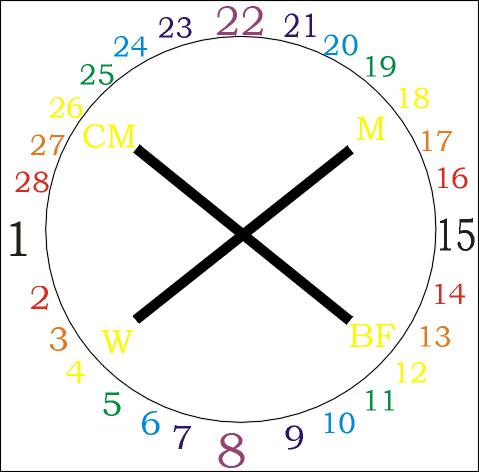
F: Curiosity
F: Fascination of sin
4 FCM
26 TM
| The attributes of the Faculties when Will is at Phase 4 | derived from | modified by | from | description | ||
| Will | Desire for exterior world | 4 | ||||
| Mask | True | Passion | 18 | BF | 26 | Enforced disillusionment |
| False | Will | CM | 12 | Emotional philosophy | ||
| Creative Mind | True | First perception of character | 26 | BF | 18 | The Hunchback |
| False | Mutilation | FCM | 4 | Fascination of sin | ||
| Body of Fate | Search | 12 | ||||
| Composite of Faculties | |
|---|---|
| true | Desire for the exterior world seeks to deliver first perception of character, modified by the Hunchback, from passion, modified by enforced disillusionment, with the help of search. |
| false | Desire for the exterior world is misdirected into mutilation, modified by fascination of sin, bringing will, modified by emotional philosophy, separated from search. |
 | Attributes of Phase 4 | affects | modifies | |
| Will | Desire for primary objects | 4 | - | |
| Mask | T:
Intensity through emotions
F: Curiosity | 18 | - | |
| Creative Mind | T:
Beginning of the abstract supersensual
F: Fascination of sin | 26 | 12 TM 4 FCM | |
| Body of Fate | Enforced intellectual action | 12 | 18 FCM 26 TM | |
See AV B 109-10 & 96.
�An old hunter talking with gods� (from Browning�s Pauline, a favourite line quoted in Preface to Gods and Fighting Men, Introduction to Bishop Berkeley and �Are You Content�)
Yeats�s description of the phase from A Vision | |
|
When out of phase he attempts antithetical wisdom (for reflection has begun), separates himself from instinct (hence 'mutilation'), and tries to enforce upon himself and others all kinds of abstract or conventional ideas which are for him, being outside his experience, mere make-believe. Lacking antithetical capacity, and primary observation, he is aimless and blundering, possesses nothing except the knowledge that there is something known to others that is not mere instinct. True to phase, his interest in everything that happens, in all that excites his instinct ('search'), is so keen that he has no desire to claim anything for his own will; nature still dominates his thought as passion; yet instinct grows reflective. He is full of practical wisdom, a wisdom of saws and proverbs, or founded upon concrete examples. He can see nothing beyond sense, but sense expands and contracts to meet his needs, and the needs of those who trust him. It is as though he woke suddenly out of sleep and thereupon saw more and remembered more than others. He has 'the wisdom of instinct', a wisdom perpetually excited by all those hopes and needs which concern his well-being or that of the race (Creative Mind from Phase 12 and so acting from whatever in race corresponds to personality unified in thought). The men of the opposite phase, or of the phases nearly opposite, worn out by a wisdom held with labour and uncertainty, see persons of this phase as images of peace. Two passages of Browning come to mind:
(AV B 109-10) |
See a broader view of the Phase in the consideration of the Phase Triads.